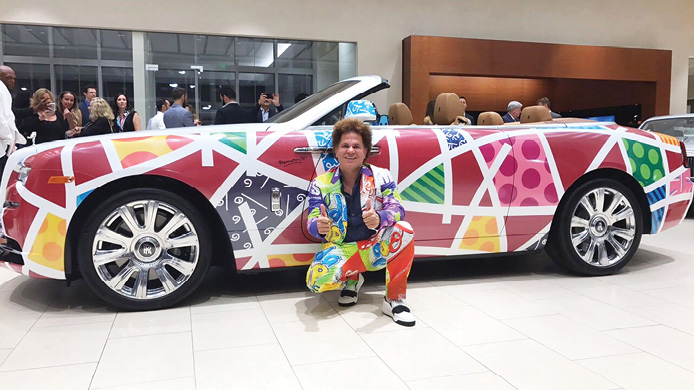- Home
- Media Kit
- Current Issue
- Past Issues
- Ad Specs-Submission
- Ad Print Settings
- Reprints (PDF)
- Photo Specifications (PDF)
- Contact Us


![]()
ONLINE

The Journey of an Artist

Romero Britto in front of a Rolls Royce Dawn he painted
Editors’ Note
Romero Britto (britto.com) has created a completely new expression that reflects his optimistic faith in the world around him. Alluding to influences of early and modern masters, Britto’s pulsating colors, pop themes, and commanding compositions have led to his becoming the premier contemporary artist of his generation. Britto lived an extremely modest lifestyle while growing up among eight brothers and sisters in Recife, Brazil. However, his innate creativity allowed him to fill his life with vibrant color and images of a beautiful world. He traveled to Europe in 1983 to examine firsthand the art of the masters. After exhibiting in a few galleries and private shows, Britto was encouraged to travel to the U.S., where pop art was flourishing. He moved to Miami and set up a studio open to the public. Britto spent the next few years exhibiting and attracting the attention of many. In 1988, he was selected alongside Andy Warhol and Keith Haring for Absolut Vodka’s “Absolut Art” campaign. Romero Britto has since been exhibited in galleries and museums in over 100 countries, including the Salon de la Société Nationale des Beaux Arts exhibition at the Carrousel du Louvre in 2008 and 2010. In December 2013, Maria Elena and Carlos Slim Domit invited Britto to be the first living artist to exhibit at Museo Soumaya. He has created public art installations for the 02 Dome (Berlin), John F. Kennedy Airport (New York), Cirque du Soleil at Super Bowl XLI, and has been credited with the largest monumental sculpture in Hyde Park (London) history. He served as an official artist for the 2010 World Cup and was appointed Ambassador to the 2014 FIFA World Cup Brazil. Britto’s pop sensibility has since leant itself to many collaborations with such brands as Audi, Bentley, Coca-Cola, Disney, Evian, Hublot, Mattel, and Technomarine, to name a few. Romero Britto is an artistic activist for charitable organizations worldwide and, most of all, an artist who believes “art is too important not to share.” He serves as a benefactor, donating time, art, and resources to over 250 charitable organizations and sits on several boards, such as Best Buddies International and St. Jude’s Children’s Research Hospital. Britto was named an inaugural founding benefactor of the Harvard International Negotiation Program by Daniel Shapiro, a program that seeks peaceful resolution to modern conflict. Britto has been selected several times to be a speaker for the arts at the World Economic Forum in Davos, Switzerland. A firm believer in the role of an artist as an agent of positive change, Romero Britto is committed to developing and supporting the powerful role art plays in world issues.
What makes Britto different, and what has been the secret to your success?
People are tired of negative news and events in the world. I talk about beautiful things – that’s in my work, and I think people are attracted to that. We all have it in common that we want something beautiful in our lives. People don’t want to deal with the bad stuff. It’s about being surrounded by things that are positive.
Was that your vision early on, and did that evolve over time?
There was never a vision. I wanted to create but I was never planning it and said I wanted it a certain way. Many businesses have a strategy to determine what they want to put out. That was never the case for me. It was being very casual, and it’s part of my journey as an artist.
.jpg)
Romero Britto with Carlos Slim and Romero’s painting
of his family
How much of a focus has licensing been for you, and have you seen growth in that area?
We work on that. I’m an artist and the result of success in art with my paintings comes from companies that want to partner with me. However, it’s not like we are looking every day for companies to work with. All of the companies we are now working with approached us.
One focus for myself and my team moving forward is to work with an animation that is going to be developed for children’s television, as well as on about 600 items coming to market sometime in the fall.
Looking at the business of art, you are an artist who likes to create. How do you balance that with the business side, especially with the broad range of relationships and a business that has grown so quickly?
I have to be careful that I don’t spend too much time on business, but one complements the other. It’s helpful that millions of people in the world may not be exposed to the arts, but because they see a Coca-Cola bottle that I did for the Olympics in Brazil or see something else I have done, they get exposed.
Just recently, a woman started collecting my art because she bought a calendar in one of the main supermarkets in America called Publix many years ago. Because of that, she fell in love with my work, and she’s now collecting my original pieces. Everything started with the calendar when she was much younger and now she’s very successful and she can buy what she wants.
Will you highlight how Britto TV came about?
I’m doing a cartoon with a studio in California called Gray Matters and Nirvana, and we’re going to produce it for television. It should come out in 2018/2019.
There are many who collect for long-term value and there are those who collect pieces they want. Are you focused on appreciation and the investment of art or are you focused around creating happiness for today?
If one will go back to artists from the past, when one is thinking about history or markets, they will see that nothing is guaranteed. It’s all about a good piece of art and a good story. So many times today, we see artists whose pieces should be selling for so much more than they are. Few people realize this.
People used to say horrible things about Andy Warhol, and now his art sells for a ton. People said he was not creative. When the focus is just money, it is often not a good piece of art.
What advice do you give to young artists who are just getting started about building a sustainable career?
Number one is to paint every day, work every day, and have strong relationships and stay engaged. The most important thing is to work every day, because many artists get wrapped up in the whole thing and forget about creating the art. The artist can’t forget about that. They can’t think about the money because that will come.•